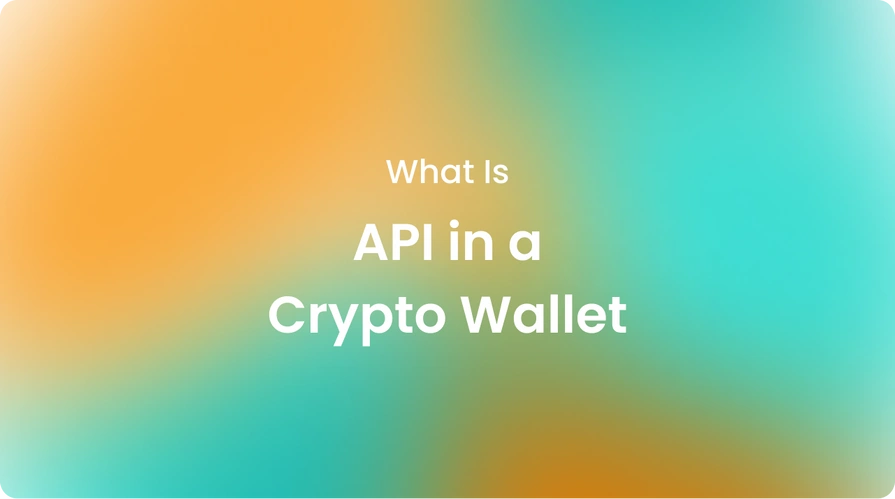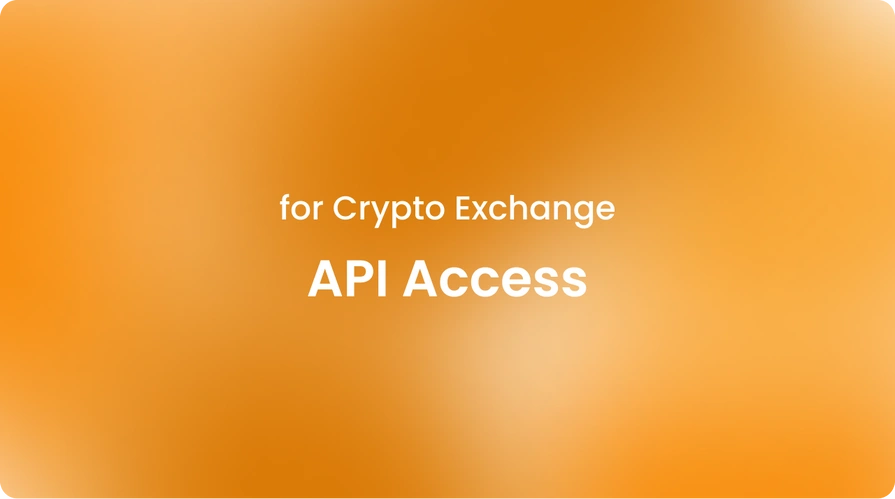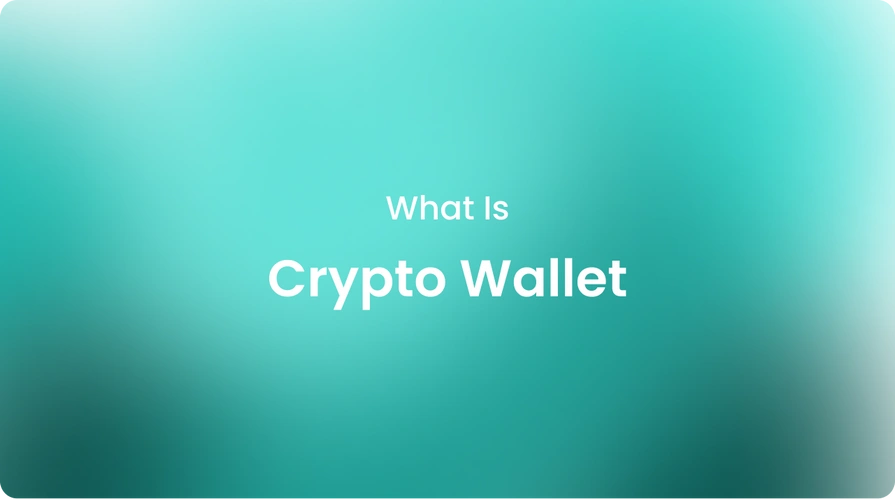|crypto, knowledgehub
What Is the API in a Crypto Wallet?

The API in a crypto wallet plays an important role as it acts as an intermediary that allows different software components to communicate with each other.
In the case of crypto wallets, the application programming interface (API) facilitates the transfer of data between the wallet and the blockchain network it connects to.
For example, when a user sends a crypto payment from their wallet, the wallet first communicates this request to the relevant blockchain network via the API.
The blockchain network then processes the transaction and returns a response confirming whether it was successful or not back to the wallet through the API. Similar process happens for API access for crypto exchanges.
Join us in this blog as we go further in detail on API, types of it, crypto API, API key, and API in a crypto wallet. You will have a comprehensive understanding of APIs by the end of our guide. Let’s start!
What is an API in blockchain?
Blockchain APIs provide developers with the tools needed to access blockchain data and execute operations on the network without requiring direct interaction with the underlying protocol.
Instead of handling the technical specifics themselves, developers can leverage simple HTTP requests to interact with the blockchain. This allows them to retrieve information like balances, transaction histories, ERC20 token allowances, and more.
API in blockchain also enables the issuing and signing of transactions on networks like Ethereum to send crypto payments or interact with smart contracts, or smart contracts 2.0.
What are the four types of API?
The four main types of APIs are:
- Node APIs: Provide direct access to a blockchain node, allowing developers to push transactions, query data, and more.
- Smart Contract APIs: Allow interaction with smart contracts, calling functions, and reading and writing states.
- Websocket APIs: Provide real-time notifications for events like new blocks or transactions.
- Blockchain Data APIs: Provide indexed and historic blockchain data through a unified query interface.
What is the use of the crypto API?
Crypto APIs have many important applications:
- Building wallets: Wallet developers or wallet as a service providers can leverage crypto APIs to build wallet features like sending and receiving funds, fetching balances, and transaction histories.
- Exchanges: Cryptocurrency exchanges rely on crypto market data APIs to fetch live prices and trends for crypto trading purposes. They also use API access for crypto payments to process deposits and withdrawals.
- Payments: Merchants integrating crypto payments can use exchange APIs to generate payment addresses, process transactions, and automate fund forwarding.
- Analytics: Price trackers, portfolio apps, and other crypto analytics tools use APIs to retrieve data for interactive dashboards, reports, and visualizations.
- Market Making: Automated market-making bots rely on real-time market data from APIs to trade on many crypto exchanges simultaneously.
Nearly any application interacting with cryptocurrency networks or needing blockchain technology data utilizes APIs. They are foundational to accelerating development while avoiding recreating the wheel.
Is the crypto API safe?
When used properly, crypto APIs can be reasonably secure. Most providers have implemented authentication methods like API keys or signatures to prevent unauthorized access. Many also allow restricting requests to specific endpoints or IP addresses. However, some risks still exist:
- Storing API keys unsafely in code repositories or websites can expose them.
- Server misconfigurations may unintentionally expose API keys or credentials.
- Malicious employees with system access at an API provider could potentially compromise private keys or intercept sensitive business data.
To mitigate risks, it's advisable to generate unique restricted-access API keys per application. Code and server configurations should also be closely monitored and protected.
Limiting overall API access to only trusted internal IPs can add another layer of protection. The risks are relatively low compared to alternative self-hosted node implementations, but proper security hygiene is still important.
You can also trust crypto service providers for secure and expert solutions for APIs. Cryptobunq is an expert and reliable one-stop-shop crypto service provider for your different crypto needs, including exchange APIs.
What is an API key?
An API key is a unique encrypted identifier given to developers by API providers after completing authentication. It acts as a digital credential, associating all API requests made by a project with the owner's account.
Most APIs require including the key as a parameter in each request to verify permissions and rate limits. This prevents unauthorized parties from accessing restricted resources like premium datasets or submitting transactions on another's behalf.
API keys supplement other authentication strategies, such as signing requests to confirm that they came from authorized clients. Therefore, they provide more security for your transactions.
Is an API key necessary?
While some public APIs don't require keys, they are almost universally necessary for paid plans with extensive usage quotas or sensitive resources like real-time market data. Requiring API keys allows providers to:
- Associate usage metrics to bill customers accurately.
- Prevent abuse from excessive bot usage.
- Mitigate DDoS risks by restricting throughput capacity to key owners.
- Trace request sources forensically in the event of fraud or disputes.
For these reasons, API keys are essential for most commercial development scenarios involving financial data, user analytics, or network interactions on behalf of customers and partners. Open-source usage without quotas may be an exception where anonymous public endpoints suffice.
How do you build crypto wallets using APIs?
There are a few common ways crypto wallets leverage blockchain APIs:
- Generate new addresses: Using /wallet/address endpoints to programmatically create receive addresses for deposits.
- Fetch balances: Call /wallet/balance/{address} to populate balances in the wallet interface.
- View transactions: Access /wallet/transactions to fetch and display past sends and receives.
- Send payments: Issuing signed transactions via /wallet/send with API signatures and keys for authentication.
- Stream websockets: Integrating websocket streams for faster notifications of new deposits.
Mainstream wallets also offer merchant APIs for payment processing. These allow generating a new receiving address per order, submitting transactions from the prefunded wallet, and automatically forwarding received deposits.
Blockchain APIs provide fundamental infrastructure for building intuitively accessible, high-performance types of crypto wallets, such as DeFi wallet, that seamlessly integrate with networks at scale. They do the heavy technical lifting behind the scenes for a great user experience. Therefore, CBQ is a secure choice.
Conclusion: exploring blockchain APIs' role in expanding crypto access
Blockchain APIs are core infrastructure that accelerate crypto wallet development by eliminating the need to recreate the plumbing underlying each network.
They securely expose data and functions through standards-based interfaces like REST and JSON, allowing developers to focus on building great user experiences.
While proper security safeguards must still be implemented, APIs streamline crucial fintech tasks like sending and receiving funds, fetching balances, processing payments, and monitoring transactions in real-time.
Crypto APIs make it easier for cryptocurrencies to be used in new and advanced fintech apps. This increases the industry's impact and potential to change how value is transferred around the world through open financial systems.
Cryptobunq is a crypto-friendly digital bank that provides a roadmap with APIs, turn-key solutions, and full-service backend operations, removing risk assumptions and complexity.
This is useful for new entrepreneurs thinking about making crypto product prototypes, startups integrating altcoins, or businesses looking at blockchain strategies.
You can also benefit from our other solutions, such as batch payments, node as a service, checkout and invoicing, custody and wallet, EURK stablecoin, tokenization, and more.
Take your crypto business to a new level by integrating with Cryptobunq to focus on business value instead of reinventing infrastructure. Request access on our website to explore partnership benefits today and contact us!













